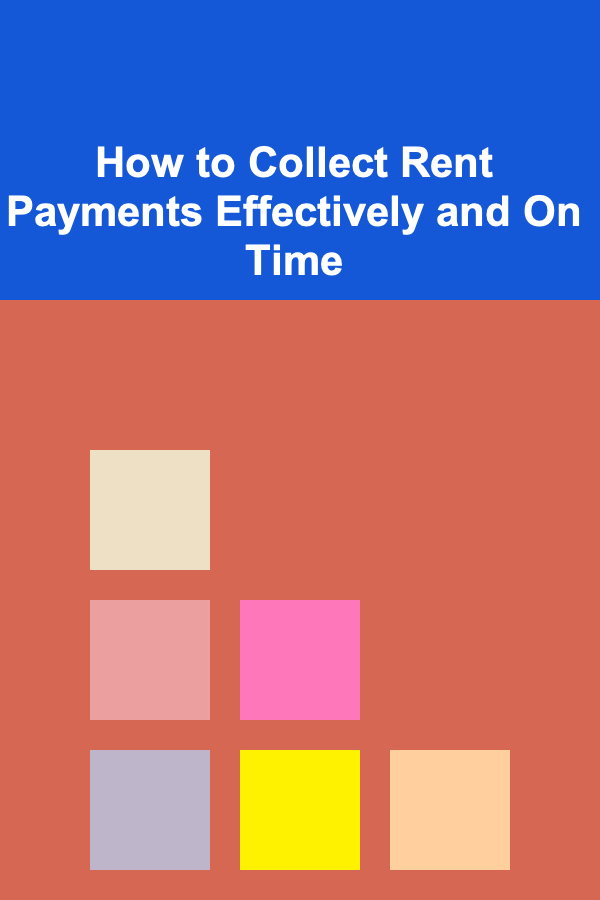
How to Collect Rent Payments Effectively and On Time
ebook include PDF & Audio bundle (Micro Guide)
$12.99$10.99
Limited Time Offer! Order within the next:

Rent collection is one of the most crucial tasks in property management. For landlords, it is essential not only to maintain the physical upkeep of their properties but also to ensure that rental income flows consistently and on time. Whether you are a first-time landlord or have been managing properties for years, developing an effective strategy for collecting rent is fundamental for the financial success of your rental business.
In this article, we will explore the various methods of collecting rent, provide tips on how to ensure timely payments, and discuss legal considerations and strategies for dealing with late payments. We will also look at how technology has impacted the rent collection process and how you can take advantage of these tools to make the process smoother and more efficient.
Understanding the Importance of Timely Rent Collection
Timely rent collection is vital for the financial health of a rental business. When rent is collected on time, landlords can use the funds for maintenance, property taxes, mortgage payments, and other essential business expenses. Delayed rent can lead to cash flow problems, forcing landlords to dip into personal savings or take out loans to cover costs. Additionally, late rent payments can lead to frustrations and complications with tenants, potentially damaging landlord-tenant relationships.
It is essential to understand that effective rent collection is not just about getting money from tenants but also about establishing a mutually respectful relationship with them. Setting clear expectations and enforcing agreed-upon terms in a fair and transparent manner will foster a positive rental environment.
Choosing the Right Rent Collection Method
There are several ways landlords can collect rent from tenants, each with its own set of benefits and drawbacks. Choosing the right method depends on the landlord's preferences, the tenants' preferences, and what works best for the specific rental property.
1. Traditional Cash or Check Payments
Cash and check payments are the most traditional methods of collecting rent. They are straightforward and easy to understand. Tenants hand over physical cash or write a check, and landlords deposit the payment into their bank account.
Benefits:
- Simple and direct.
- No processing fees or commissions for the landlord.
Drawbacks:
- Risk of lost payments, especially with cash.
- Inconvenient for both landlords and tenants if they are not nearby.
- Time-consuming, as the landlord has to physically deposit checks at the bank.
Although traditional methods are still used, many landlords are now transitioning to digital options for convenience.
2. Online Payment Platforms
Online rent payment platforms have gained popularity in recent years, offering a convenient way for both tenants and landlords to handle rent transactions. These platforms include services like PayPal, Venmo, Rentec Direct, and Zelle, or through property management systems such as Buildium or Cozy.
Benefits:
- Tenants can pay from anywhere, at any time, as long as they have internet access.
- Landlords receive payments instantly or within a short period, which improves cash flow.
- Digital records of payments make it easier to track and manage accounts.
- Some platforms offer automated payment scheduling, reducing the risk of late payments.
Drawbacks:
- Processing fees can apply, which may reduce the net income for landlords.
- Tenants may be wary of paying online if they are not familiar with the platform.
3. Direct Bank Transfers
Direct bank transfers (or ACH payments) allow tenants to transfer money directly from their bank account into the landlord's account. This method is typically automated and scheduled on a monthly basis.
Benefits:
- Automatic payments make it easy to set up and forget about.
- Bank-to-bank transfers typically have lower fees than other online payment platforms.
- Payments are secure and fast.
Drawbacks:
- Tenants need to share their bank details, which can raise privacy concerns.
- Can be complicated for tenants who are unfamiliar with bank transfer systems.
4. Cashless Rent Payments Through Mobile Apps
Mobile payment apps such as Zelle, PayPal, or Cash App provide a fast and easy way for tenants to send payments directly to landlords. These apps allow for instant money transfers and can be linked to tenants' bank accounts, credit, or debit cards.
Benefits:
- Instant payment confirmation.
- Convenient for both landlords and tenants who use these apps regularly.
- Very little setup required for both parties.
Drawbacks:
- Some apps have limits on the amount that can be transferred, which could be inconvenient for high rent amounts.
- Transaction fees may apply, especially when credit cards are used.
5. Property Management Software
Property management software is an all-in-one solution that allows landlords to manage rent collection and other aspects of their properties. These systems often come with features for tenant screening, lease management, maintenance tracking, and accounting, in addition to rent collection.
Benefits:
- Streamlines rent collection and other property management tasks in one platform.
- Tenants can pay rent, view statements, and communicate with landlords through the platform.
- Often includes automated reminders and notices for late payments.
Drawbacks:
- May involve a subscription fee for the landlord.
- Tenants may have to become familiar with the software.
Setting Clear Expectations from the Start
One of the most critical components of effective rent collection is setting clear expectations with tenants from the start. Before the tenant even moves in, it is crucial to outline the rent payment process and explain the terms of the lease agreement. This will help avoid misunderstandings and prevent payment issues later on.
1. Lease Agreement
The lease agreement should clearly outline the amount of rent due, the date it is due, acceptable payment methods, and any late fees or penalties for non-payment. This written agreement sets the groundwork for the entire rental relationship.
Be sure to include the following points in the lease agreement:
- Rent amount and due date.
- Preferred methods of payment.
- Late fees for delayed payments.
- Grace period, if any, for rent payments.
- Consequences for failure to pay (such as eviction procedures).
2. Payment Reminders
Setting up automatic reminders for tenants can significantly reduce the risk of missed payments. Most online payment systems allow landlords to automate reminders, which can be sent via email or SMS before the rent is due.
You can also send a reminder on the due date itself to ensure tenants don't forget to pay. Friendly, non-threatening reminders can help keep the payment process professional and stress-free.
Enforcing Timely Payments and Handling Late Rent
Despite your best efforts, some tenants may struggle to pay rent on time. Effective strategies for dealing with late payments are necessary to ensure that your cash flow remains intact.
1. Establishing a Late Payment Policy
A firm but fair late payment policy is essential. If rent is not paid on time, impose a clear late fee and communicate this with your tenants. The late fee should be a reasonable amount---usually a percentage of the rent or a flat fee---and should be outlined in the lease agreement.
Be sure to set a grace period (typically between 3 to 5 days) to account for minor delays without penalizing tenants too harshly. After the grace period, the late fee should be applied, and you should begin taking further action if payment is not received.
2. Automating Late Fee Assessments
For landlords using online platforms or property management software, the automatic calculation and charging of late fees can save time and effort. This ensures consistency and eliminates any potential errors when it comes to managing late payments.
3. Personal Follow-Up
If a tenant misses a rent payment, follow up promptly. This should be done first with a gentle reminder---whether through email, text, or a phone call. In some cases, tenants may simply have forgotten to pay, or they may be experiencing a temporary financial issue.
If rent remains unpaid, consider sending a formal notice (such as a "Pay or Quit" notice) outlining the payment overdue, any penalties incurred, and a clear deadline for payment. After this point, you may need to consider further actions like eviction if the rent is still unpaid.
Leveraging Technology for Efficient Rent Collection
Technology has revolutionized the way landlords collect rent. Leveraging online tools can help reduce the administrative burden, increase payment speed, and provide better security.
1. Rent Collection Automation
Automating rent collection can ensure that payments are consistently collected on time without the need for constant reminders. Some property management software allows landlords to set up automatic rent collection on a recurring basis, so tenants' payments are deducted on the due date without any manual effort from either party.
This not only streamlines the process but also ensures timely payments every month.
2. Digital Payment Platforms
The rise of digital payment platforms like PayPal, Venmo, and Zelle provides a secure, fast, and convenient way for landlords and tenants to handle rent payments. These platforms often offer instant transfer capabilities, which can ensure that landlords receive their payments quickly, reducing the chance of delayed payments.
Using digital platforms for rent collection also provides both parties with a clear record of payments, making it easier to track payment histories and resolve any potential disputes.
3. Security Features for Online Payments
When using online payment platforms, ensure that the system you use has strong security protocols in place to protect both tenant and landlord financial information. Most reputable payment systems provide encryption and fraud detection, ensuring that payments are processed securely.
Handling Payment Disputes
Disputes can arise when a tenant believes they have overpaid, been charged an incorrect late fee, or encounter technical issues with the payment process. As a landlord, it is crucial to handle these disputes professionally and promptly.
- Documentation: Keep clear records of all rent payments, late fees, and communications with tenants regarding payment issues.
- Communication: Address disputes directly with tenants, ensuring that all parties involved understand the situation and work together to find a fair solution.
- Third-Party Mediation: If disputes become complex or escalate, consider involving a neutral third party to mediate and resolve the issue.
Conclusion
Effective rent collection is an essential part of successful property management. By setting clear expectations, choosing the right payment methods, leveraging technology, and enforcing timely payments, landlords can maintain a steady cash flow and build positive relationships with their tenants. While late payments are inevitable in some cases, having a proactive approach to handling them, including setting clear policies and using automated reminders, can minimize the impact on your business. By staying organized and professional, you can ensure that rent collection becomes one of the most efficient aspects of managing your rental properties.

How To Choose the Best Sports Documentaries
Read More
How to Clean and Maintain Wooden Floors
Read More
How to Design a Functional and Stylish Home Office During Renovation
Read More
How to Teach Your Family About Home Security
Read More
How to Use Rolling Carts for Versatile Storage Solutions
Read More
Managing Moments of Impact: A Handbook for Successful Community Management
Read MoreOther Products

How To Choose the Best Sports Documentaries
Read More
How to Clean and Maintain Wooden Floors
Read More
How to Design a Functional and Stylish Home Office During Renovation
Read More
How to Teach Your Family About Home Security
Read More
How to Use Rolling Carts for Versatile Storage Solutions
Read More